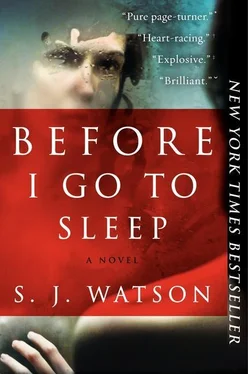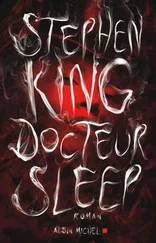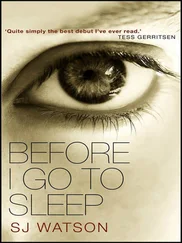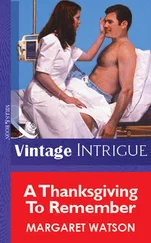“Of others?”
“You occasionally lashed out.”
I tried to imagine what it must have been like. I pictured someone waking up every day, confused, not sure who they were, or where, or why they’d been put in a hospital. Asking for answers and not getting them. Being surrounded by people who knew more about them than they did themselves. It must have been hell.
I remembered that we were talking about me.
“And then?”
He did not answer. I saw his eyes go up and he looked past me, toward the door, as if he were watching it, waiting. But there was no one there, it did not open, no one left or came in. I wondered if he was actually dreaming of escape.
“Dr. Nash,” I said. “What happened then?”
“You stayed there for a while,” he said. His voice was almost a whisper now. He has told me this before, I thought, but this time he knows I will write it down and carry it with me for more than a few hours.
“How long?”
He said nothing. I asked him again. “How long?”
He looked up at me, his face a mixture of sadness and pain. “Seven years.”
He paid, and we left the coffee shop. I felt numb. I do not know what I was expecting, where I thought I had lived out the worst of my illness, but I did not think it would be there. Not in the middle of all that pain.
As we walked, Dr. Nash turned to me. “Christine,” he said. “I have a suggestion.” I noticed how casually he spoke, as if he was asking which flavor ice cream I would prefer. A casualness that can only be affected.
“Go on,” I said.
“I think it might be helpful for you to visit the ward that you were admitted to,” he said. “The place you spent all that time.”
My reaction was instant. Automatic. “No!” I said. “Why?”
“You’re experiencing memory,” he said. “Think of what happened when we went to visit your old house.” I nodded. “You remembered something then. I think it might happen again. We might trigger more.”
“But—”
“You don’t have to. But… look. I’ll be honest. I’ve already made the arrangements with them. They’d be happy to welcome you. Us. Anytime. I only have to call to let them know we’re on our way. I’d come with you. If you feel distressed or uncomfortable we can leave. It’ll be fine. I promise.”
“You think it might help me to get better? Really?”
“I don’t know,” he said. “But it might.”
“When? When do you want to go?”
He stopped walking. I realized the car we were standing next to must be his.
“Today,” he said. “I think we should go today.” And then he said something odd. “We don’t have time to lose.”
* * *
I didn’t have to go. Dr. Nash didn’t force me to agree to the trip. But, though I can’t remember doing so—can’t remember much at all, in fact—I must have said yes.
The journey was not long, and we were silent. I could think of nothing. Nothing to say, nothing to feel. My mind was empty. Scooped out. I took my journal out of my bag—not caring that I had told Dr. Nash I didn’t have it with me—and wrote that last entry in it. I wanted to record every detail of our conversation. I did it silently, almost without thinking, and we did not speak as he parked the car, nor as we walked through the antiseptic corridors with their smell of stale coffee and fresh paint. People were wheeled past us on gurneys, attached to IVs. Posters peeled off the walls. Overhead lights flickered and buzzed. I could think only of the seven years I had spent there. It felt like a lifetime; one I remembered nothing of.
We came to a stop outside a double door. Fisher Ward. Dr. Nash pressed a button on an intercom mounted on the wall, then mumbled something into it. He is wrong, I thought as the door swung open . I did not survive that attack. The Christine Lucas who opened that hotel room door is dead.
Another double door. “You okay, Christine?” he said as the first closed behind us, sealing us in. I said nothing. “This is a secure unit.” I was hit with a sudden conviction that the door behind me was closing forever, that I would not be leaving.
I swallowed. “I see,” I said. The inner door began to open. I did not know what I would see beyond it, could not believe I had ever been here before.
“Ready?” he said.
A long corridor. There were doors off each side, and as we walked I could see that they opened into glass-windowed rooms. In each was a bed—some made, some unmade, some occupied, most not. “The patients here suffer from a variety of problems,” said Dr. Nash. “Many show schizoaffective symptoms, but there are those with bipolarity, acute anxiety, depression.”
I looked in one window. A girl was sitting on the bed, naked, staring at the television. In another, a man sat on his haunches, rocking, his arms wrapped around his knees as if to shield himself from the cold.
“Are they locked in?” I said.
“The patients here have been committed. They’re here for their own good, but against their wishes.”
“Their own good?”
“Yes. They’re a danger either to themselves or to others. They need to be kept secure.”
We carried on walking. A woman looked up as I passed her room, and though our eyes made contact, hers betrayed no expression. Instead she slapped herself, still looking at me, and when I winced, she did it again. A vision flitted through me—visiting a zoo as a child, watching a tiger pace up and down his cage—but I pushed it away and carried on, resolving to look neither left nor right.
“Why did they bring me here?” I said.
“Before you were here, you were in the general medical ward. In a bed, just like everybody else. You would spend some weekends at home, with Ben. But you became more and more difficult to manage.”
“Difficult?”
“You would wander off. Ben had to start locking the doors to the house. You became hysterical a couple of times, convinced that he had hurt you, that you were being locked in against your will. For a while you were okay when you got back to the ward, but then you started demonstrating similar behaviors there, too.”
“So they had to find a way of locking me in,” I said. We had reached a nursing station. A man in a uniform sat behind a desk, entering something on a computer. He looked up as we approached and said the doctor would be with us soon. He invited us to take a seat. I scanned his face—the crooked nose, the gold-stud earring—hoping something would ignite a glimmer of familiarity. Nothing. The ward seemed utterly foreign.
“Yes,” said Dr. Nash. “You’d gone missing, once. For something like four and a half hours. You were picked up by the police, down by one of the canals. Dressed only in pajamas and a gown. Ben had to collect you from the station. You wouldn’t go with any of the nurses. They had no choice.”
He told me that, right away, Ben began to campaign to have me moved. “He felt that a psychiatric ward was not the best place for you. He was right, really. You weren’t dangerous, either to yourself or to others. It’s even possible that being surrounded by those who were more ill than you was making you worse. He wrote to the doctors, the head of the hospital, your MP. But nothing was available.
“And then,” he said, “a residential center for people with chronic brain injuries opened. He lobbied hard, and you were assessed, and thought to be suitable, though funding was an issue. Ben had had to take a break from work to look after you and couldn’t afford to fund it himself, but he wouldn’t take no for an answer. Apparently he threatened to go to the press with your story. There were meetings and appeals and so on, but eventually he was successful, and you were accepted as a patient, with the state agreeing to pay for your stay for as long as you were ill. You were moved there about ten years ago.”
Читать дальше












